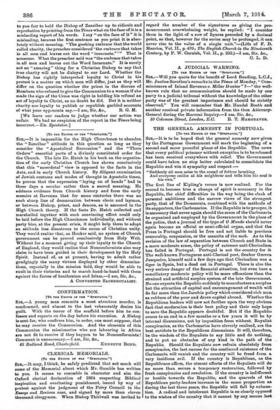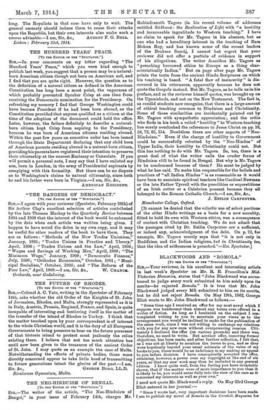THE GENERAL. AMNESTY IN PORTUGAL.
[To THE Sane. Or TIOS "aPBCr/r0s.1 is to be hoped that the general amnesty now given by the Portuguese Government will mark the beginning of a second and more peaceful phase of the Republic. The news that every political prisoner without exception is to be released has been received everywhere with relief. The Government could have taken no step better calculated to consolidate the Republic and win it sympathy and respect
Suddenly all men arise to the sound of fetters breaking
And everyone smiles at his neighbour and tells him his soul is his own."
The first line of Kipling's verses is now realized. For the second to become true a change of spirit is necessary in the Republic, the chief difficulties in the way being the clash of personal ambitions and the narrow views of the strongest party, that of the Democrats, combined with the methods of its supporters, the Carbonarios. If the Republic is to prosper, it is necessary that never again should the scum of the Carbonaria be organized and employed by the Government in the place of the police, that a journal of the type of 0 Mundo should never again become an official or semi-official organ, and that the Press in Portugal should be free and not liable to previous censorship, suspension, or the assaults of the mob. As to the revision of the law of separation between Church and State in a more moderate sense, the policy of extreme anti-Clericalism has failed in Portugal. Portugal is not the country for it The well-known Portuguese anti-Clerical poet, Senhor Guerra Junqueiro, himself said a few days ago that Clericalism was a tiger in Spain, but a dead cat in Portugal. There is also the very serious danger of the financial situation, but even here a conciliatory moderate policy will be more efficacious than the strained and artificial surplus system of the late Government. No one expects the Republic soddenly to manufacture a surplus but the attraction of capital and encouragement of wealth will do far more than the Jacobin policy which considered rich men as robbers of the poor and drove capital abroad. Whether the Republican leaders will now act further upon the very obvious fact that moderation is their best policy and their only hope to save the Republic appears doubtful. But if the Republio comes to an end in a few months or a few years it will be by internal dissensions, not by imposition from without. Royalist conspiracies, as the Carbonarios have cleverly realized, are the best antidote to the Republican dissensions. It will, therefore, be the wisdoin of the Royalists to say little and do nothing, and to pat no obstacles of any kind in the path of the Republic. Should the Royalists now refrain absolutely from conspiracies, the last excuse for the continued existence of the Carbonaria will vanish and the country will be freed from a very insidious evil. If the country is Republican, as the Republicans affirm, the utmost efforts of the Royalists will do no more than secure a temporary restoration, followed by fresh conspiracies and revolution. If the country is indifferent or hostile towards the Republic, and the quarrels of the Republican party-leaders increase in the same proportion as during the last three years, the Republic will fall by exhaus- tion. A radical and intolerant Republic is so clearly opposed to the wishes of the country that it cannot by any means last
long. The Royalists in that case have only to wait. The general amnesty should induce them to cease their attacks upon the Republic, but their own interests also make such a course advisable.—I am, Sir, &c., Ausasv F. G. BELL. Lisbon : February 21st, 1914.















































 Previous page
Previous page